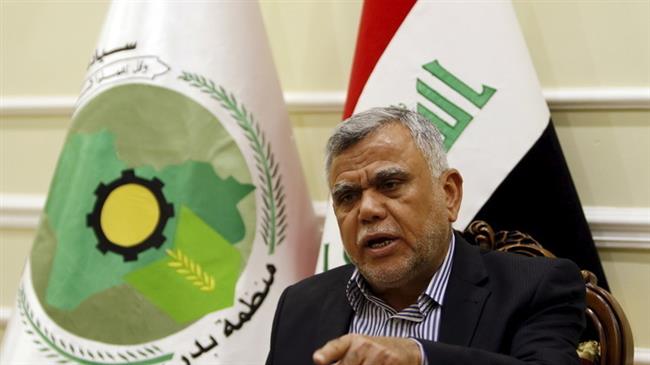Iraqi Hashd Sha'abi leader says he won't run for premiership
Secretary General of Iraq's Badr Organization, who is also the leader of the political Fatah (Conquest) Alliance and the pro-government Hashd al-Sha’abi (Popular Mobilization Units), has withdrawn his candidacy for prime minister, stressing the need for political consensus in order to make progress in the Arab country’s political process.
“I would like to announce to the dear Iraqi people the withdrawal of my candidature for the head of the Council of Ministers, to open the way for serious dialogue to elect a prime minister and his government according to the vision of the Supreme religious authority,” Ameri said in a press conference in Baghdad on Tuesday.
He added, “There is no choice but reaching consensus in the political process, and prioritizing public interests over private ones.”
On September 13, outgoing Iraqi Prime Minister Haider al-Abadi said he was not seeking to serve a second term in office.
“We respect and obey the instructions of the religious authority Ayatollah Ali al-Sistani. I did not and will not request the post of prime minister in the second term,” he said at a news conference in Baghdad
Ayatollah Sistani, the country’s most senior cleric, said earlier this month that Iraq needed new faces in the government as protests escalated in the southern oil-rich city of Basra and Baghdad.
Iraqi lawmakers on Saturday elected former governor of Anbar Province Mohammed al-Halbousi as the speaker of the 329-seat parliament, putting the country one step closer to forming a government for the next four years.

During a parliamentary session with 298 lawmakers in attendance, Halbousi garnered 169 votes, while his competitor, former Defense Minister Khalid al-Obeidi, obtained 89 votes.
Former parliament speaker Osama al-Nujaifi and politician Mohammed al-Khalidi received lower numbers of votes.
The two leading parliamentary coalitions of Sairoon and al-Fatah have called on Abadi to step down over deadly protests in the southern oil-rich port city of Basra.
“We demand Abadi and his government to resign immediately and to apologize to the people of Iraq,” Hassan al-Aqouli, spokesman for Sairoon coalition, backed by influential Shia cleric Muqtada al-Sadr, said in a press conference earlier this month.
Aqouli added, “Sairoon Coalition is seeking to form a national and strong government to save the country.”

The Fatah alliance also asked Abadi to resign, noting that “all political blocs agree that Abadi's government has failed to meet its commitment toward Basra province.”
“The people of Basra are fed up with the promises of the government,” Ahmed al-Asadi, spokesman of Fatah alliance, said.
At least 12 protesters were killed in Basra and many of its institutions were set ablaze. Calm returned to the city late on September 8.

Basra has long witnessed complaints among its 2.5 million residents about failing infrastructure, power cuts and corruption. Water supply is also widely criticized for high salinity.
Anger boiled over on September 4 after more than 30,000 people were hospitalized by water pollution.
US fighter aircraft shot down ‘in friendly fire’ amid aggression on Yemen
Yemeni FM: Israel’s sponsors accountable for ongoing aggression on Sana’a
Eight Palestinians killed as Israel attacks Gaza school, hospitals
VIDEO | Rome, Milan host new protests in solidarity with Palestinians
Dec. 21: ‘Axis of Resistance’ operations against Israeli occupation
Spain jurists demand ties with Israel ties be cut
VIDEO | Press TV's news headlines
VIDEO | Iran honors top Science Olympiad medalists

















 This makes it easy to access the Press TV website
This makes it easy to access the Press TV website